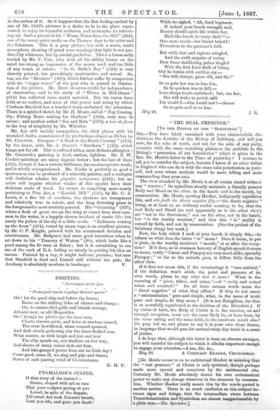"THE REAL PRRSENCE."
[To THE EDITOR OF TIIE "SPECTATOR."]
San,—You have lately examined with your characteristic dis- . • gladness the doctrine of . the Bishop of Salisbury, and will you now, for the sake of truth, and not for the sake of any party, examine with the same searching plainness the antidote to the Bishop's "perversion of our formularies" which is given in the Rev. Mr. MOule's letter in the Times of yesterday? I venture to ask you to consider the subject, because I know of no other writer in England who can do it with the same calm penetration as your- self, and none whose analysis would be more telling and more commanding than your own.
The view attacked by Mr. Mollie is at all events stated without any " reserve ; " its upholders stoutly maintain a literally present Body and Blood on the altar, in the hands and in the mouth, by consecration. Mr. Moule, quoting Hooker, indignantly repudiates this, and sets forth the direct negative (?)—" the direct negative" being, or at least to an ordinary reader seeming to be, that the real Body and Blood (as real apparently as in the other view) arc "not in the Sacrament," not on the altar, not in the hands, but "in the worthy receiver," and that this "in" reality is caused by faith, and not by consecration. (See the protest of the Salisbury clergy last week.)
Now, the help which I seek at your hands is simply this,—to inform us what does the latter "in" mean? Does it mean, to put it plain, in the worthy receiver's "mouth," at or after the recep- tion? If it does, as in common honesty of English speech it seems to mean, verily " Comm and Pompey are very much alike, specially Pompey ; " so far as the miracle goes, it differs little from the other view.
If it does not mean this, if the terminology is "non-natural," if the definition won't abide the point and pressure of its own words, please to say what does it mean? What is the meaning of "given, taken, and eaten,"—of " verily and indeed taken and received ? " Do all these solemn words mean the "direct negative" of what they affirm ? If they do not assert a " substantiation " pure and simple, what, in the name of truth pure and simple, do they mesa? (It is not Zuingliism, for that is as scornfully reprobated as the doctrine of the Ritualists.) If by virtue of faith, the Body of Christ is in the receiver, on and through reception, must not the same Body be, or have been, by the same eating and the same faith, in the receivers mouth also ? Do pray tell us, and please to say it in your own clean Saxon, in language that would pass for natural every-day truth in a court of justice.
I do hope that, although this letter is from an obscure stranger, you will consider the subject to which it alludes important enough to engage your attention.—I am, Sir, &c.,
May 28. A CONSTANT READER, CH °ECKMAN.
[Mr. Moule seems to us to understand Hooker as meaning that the "real presence" of Christ is only spiritual, though perhaps made more special and conscious by the sacramental rite. Certainly Mr. Motile absolutely denies his own ecclesiastical power to make any change whatever in the elements by consecra- tion. Whether Hooker really meant this by the words quoted is another matter. There is so much confusion on this subject be- tween signs and things, that the intermediate views between Transubstantiation and Symbolism are almost inapprehensible by a plain man.—En. Spectator.j






























 Previous page
Previous page